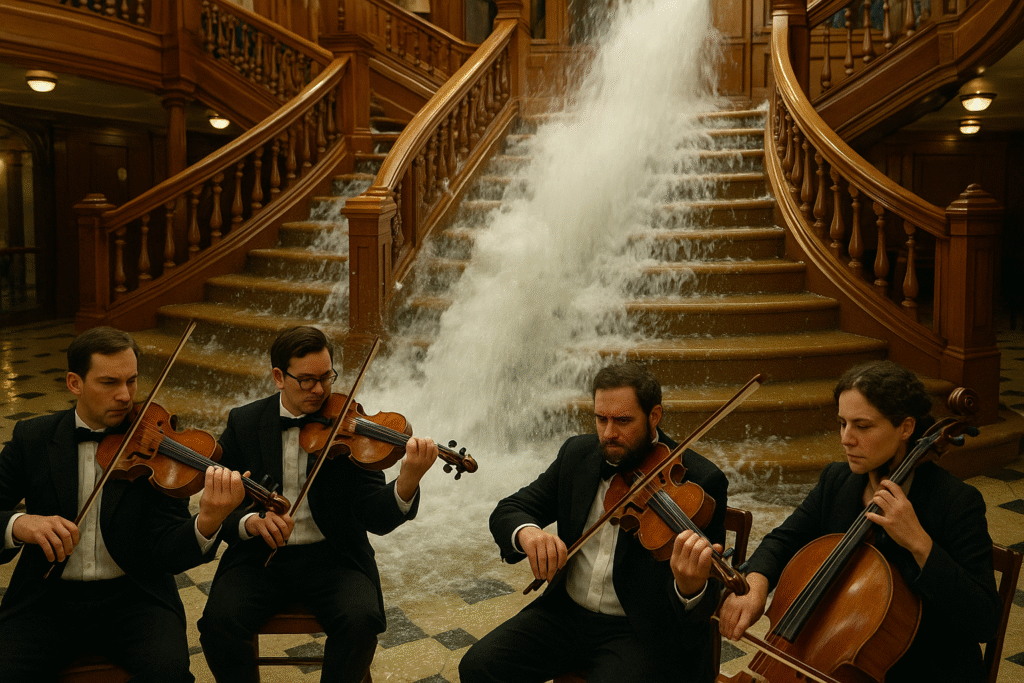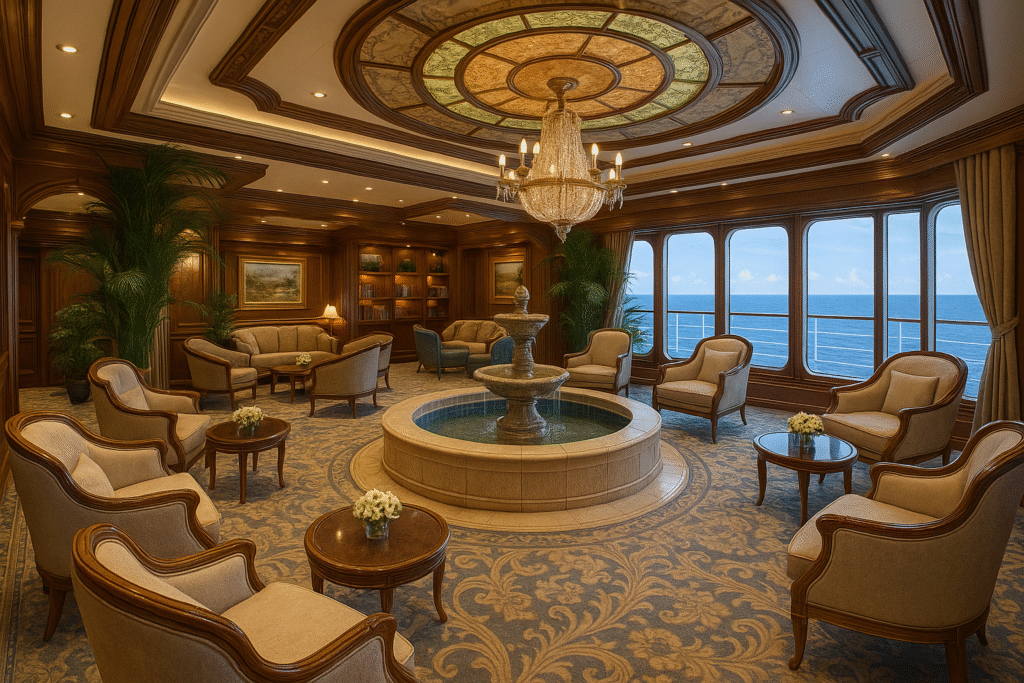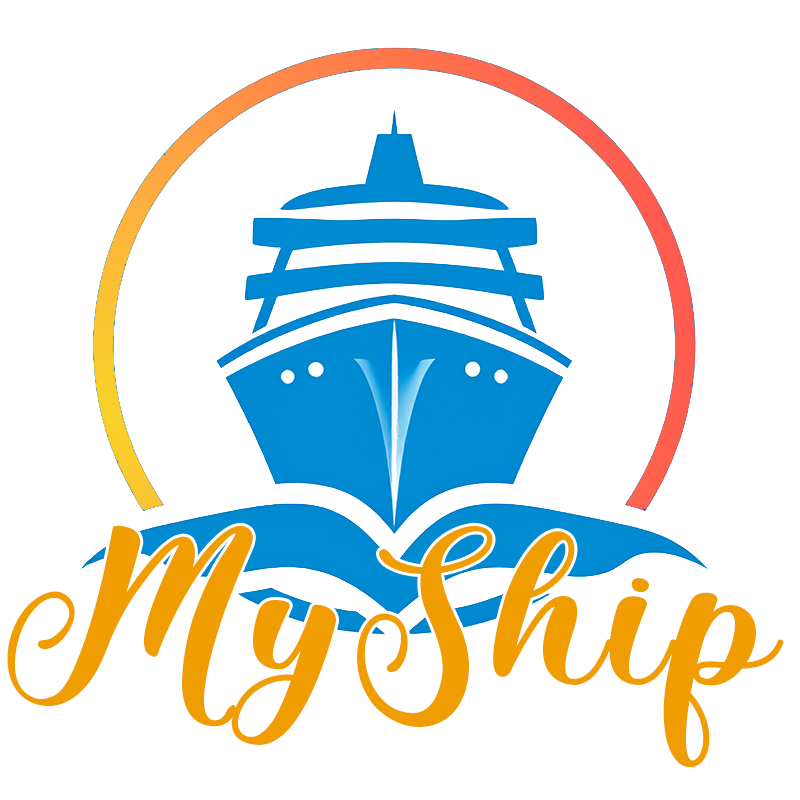Part II: When the Ship Hits the Fan
While individual misbehavior provides a constant stream of drama, the most memorable stories often arise when large-scale incidents affect the entire vessel. These moments strip away the vacation fantasy, revealing the raw reality of being on a massive, complex machine in the middle of the ocean and highlighting the fragility of order in this isolated environment.
Bravo, Kilo, and the Titanic Theme Song

Onboard emergencies range from the darkly comical to the genuinely terrifying, and passenger reactions show the different ways people cope when their sense of security is shattered. In one instance of sublime, cinematic irony, a pipe ruptured on a ship, sending water rushing down a grand staircase. As this was happening, the ship’s musicians were, by pure coincidence, playing the theme song from Titanic.
Other emergencies are far less amusing. During a 2016 voyage off the British coast, a ship sailed directly through Storm Katie, enduring near-constant winds exceeding 90 mph (145 kmph) for several days—well into hurricane-force territory. The experience was described as “bedlam.” The ship rolled so severely that it was almost impossible to walk, and it maintained a permanent list, or tilt, even when conditions stabilized. A crew member in the onboard stores reported losing an “insane amount” of stock, including several Swarovski crystal sculptures that were so thoroughly shattered they had to be swept up with a broom. Another crew member noted that he had become so acclimatized to the ship’s lean that when it finally returned to normal, he hit his head on the showerhead because he wasn’t used to standing up straight.
The most frightening moments come in the form of cryptic ship-wide announcements. One passenger recounted waking in the middle of the night in rough seas to the alert “Bravo, Bravo, Bravo”—the code for a fire. This was followed minutes later by “Kilo, Kilo, Kilo,” the signal for all crew to report to their muster stations and prepare the lifeboats. These codes represent the ultimate stress test of the cruise ship’s infrastructure, piercing the vacation bubble with the terrifying possibility of real disaster. The horror can also be deeply personal and gruesome, as one family discovered when they encountered sheets of blood streaming down elevator doors—the result of an electrician who had been crushed to death during routine maintenance. At the other end of the spectrum is the infamous Carnival “poop cruise,” where an engine fire cut all power, leaving the ship adrift for four days with overflowing toilets, forcing passengers to live in makeshift tents on deck to escape the stench.
The Crew’s Secret World

Behind the passenger-facing curtain of smiles and service, the crew inhabits an entirely different reality, one filled with incredible, often harrowing, situations that are deliberately concealed from the guests. The crew acts as the guardians of the passenger fantasy, actively constructing a sanitized reality to ensure the vacation atmosphere remains undisturbed. They are not just service workers; they are reality managers.
A crew member shared the story of a “man overboard” call that went out around 2 a.m. Security immediately stormed the crew bar, sending everyone to their rooms—an unusual procedure that caused widespread fear among the staff. It was later revealed that there was no person overboard. Instead, the ship had rescued a boat full of refugees, and the crew bar was being used as a secret holding area before they were dropped off in port the next day. In another shocking incident, someone on shore fired a gun at the ship’s navigation bridge. The bullet bounced off and struck a crew member on her hand as she relaxed in the private crew pool area. To avoid causing panic, the captain announced to passengers that the departure was being delayed to “take on fresh water” while local police came aboard to investigate.
The crew is also tasked with the stomach-churning aftermath of passenger indulgence. One housekeeper recounted being called to a room where a guest had an explosive gastrointestinal event. The report stated that feces was “everywhere. On the floor, carpet, bed, curtains, ceiling, bathroom.” The guest, who claimed to have simply overeaten, offered no apology. This stark dichotomy between the passenger experience and the crew experience creates a surreal dynamic. The crew holds knowledge of life-or-death situations and deals with the most visceral human messes, all while maintaining a veneer of calm professionalism to protect the carefully crafted illusion for which the passengers have paid. They are both protectors and servants, living in a world of secrets just below the lido deck.
—To be continued—
